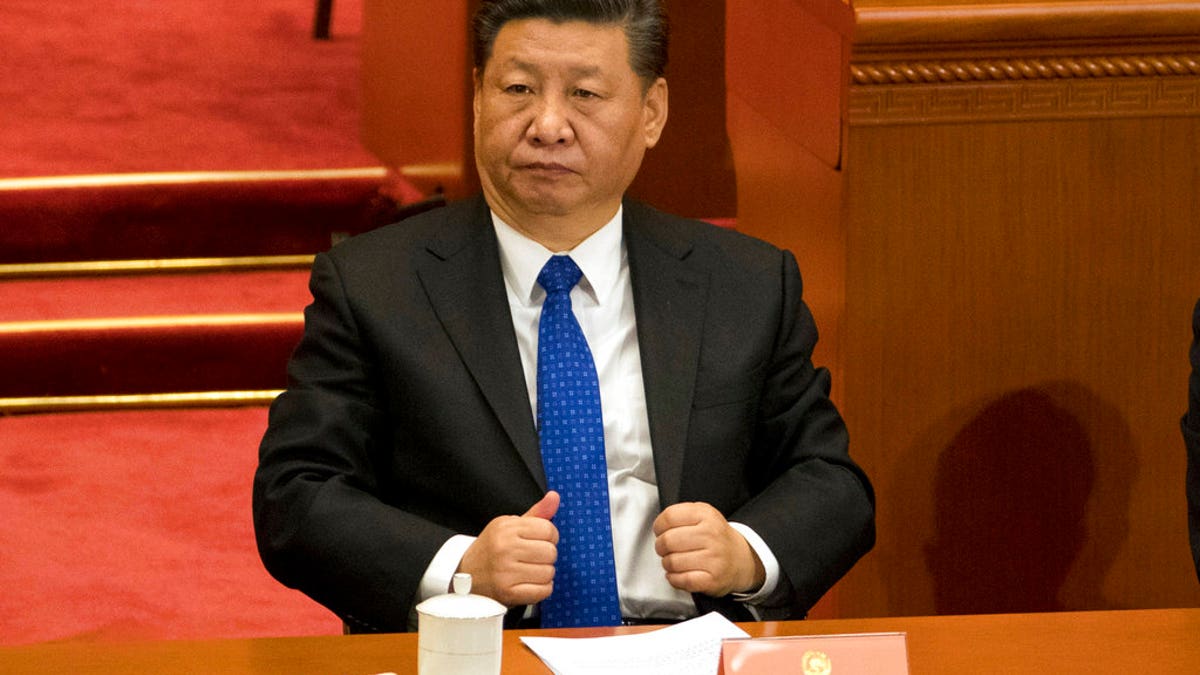Fox News Flash top headlines for May 16
Fox News Flash top headlines for May 16 are here. Check out what's clicking on Foxnews.com
She was once the People’s Republic of China’s biggest screen and social media star, as well one of its most precious exports. But for most of the past year, 37-year-old Fan Bingbing – who lit up box offices with roles in big-budget epics from “Iron Man” to “X-Men” – was nowhere to be seen.
While there was no official Chinese government announcement as to Bingbing's whereabouts, China expert and film attorney, Robert Cain, told Fox News it was widely reported that Bingbing was made to pay $136 million in tax-related fines and banished to months of house arrest.
Then, out-of-nowhere, Bingbing walked the carpet at a Beijing gala in April. She even posted a picture to Instagram. And over the past week, the actress and beauty product maven has been filling her social media feed with snaps of her charity work.
WHAT CHINESE SPIES WANT FROM AMERICANS

Bingbing’s saga started in May 2018. (AP)
Bingbing's exile it seems is now over. But questions over her disappearance and punishment remain unanswered, and the ripple effects are still reverberating throughout the once-booming Chinese movie business.
Bingbing’s saga started in late May of last year when a prominent Chinese TV reporter revealed that she had two contracts for her upcoming role in “Cellphone 2” alongside Bruce Willis. One contract put her salary at $7.8 million, the other put it at $1.5 million – and she was reported to have only submitted to paying taxes on the latter.
The expose ignited a wildfire of panic well beyond her team of handlers.
“It had an enormous impact, it sent shockwaves through the industry. I don’t think there was much opportunity for legal appeals,” Cain said. “Either you did what the government told you to do or risk going directly to prison.”
Indeed, with the authorities on her tail, Bingbing disappeared and her Willis co-starring flick got shelved. She emerged in October to issue a public apology on social media for “not setting a good example for society and the industry,” and lamenting that she felt “ashamed and guilty.”
According to filmmakers and industry professionals, the Chinese film industry – the once shiny moneymaking focus of Hollywood’s lens – has also been wounded.
“It has triggered a crackdown on tax evasion in the Chinese entertainment industry. Entertainment companies are getting their tax affairs in order,” noted Mathew Alderson, a Beijing-based entertainment and international transactional lawyer. “Many are closing the offices they opened in regional tax havens.”

She was once the People’s Republic of China’s biggest screen and social media star, as well one of its most precious exports. (Reuters)
Vanity Fair reported that the Bingbing ordeal prompted related companies to plunge ten percent on the Chinese stock exchange, it's topmost daily limit.
“The industry is going through a hard time. The authorities now pay more attention to strictly regulating the operations of film companies due to these scandals and tax evasions,” noted Zhen Huang, legal counsel at the Shanghai Film Company. “Thus, the whole capital market has shown less interest in the industry here. Most of the Chinese film companies now are short on funds, just trying to survive by reducing their programs.”
PAUL WARNS TRUMP ADMINISTRATION AGAINST ESCALATING TRADE WAR WITH CHINA
According to Huang, the Fan Bingbing scandal led to the industry’s economic descent, and she is more than likely too tainted to make a comeback.
“Most think she will (soon) quit the industry,” he said. “Because, in China, there are unwritten rules that the movie or TV play or show containing actor or actress involved in a suspected offense of the law, public order, or good custom is prohibited.”

Some say Bingbing is still a prized asset to the Chinese leadership as the nation’s most famous leading lady with serious Hollywood credentials. (AP)
However, some industry experts contend that Bingbing was merely a “victim” of a larger plot to bring her – and perhaps the broader industry – under tighter government reins.
“It is not clear that she broke the law. Companies often use two sets of books to allow a lower effective rate,” contended David Jacobson, Executive Director of Online Education for Southern Methodist University's online MBA program, as well as a professor of the practice of business law, who previously worked as general counsel in China. “Fan was never charged with a crime. Her problem was not that she necessarily did anything wrong, but the public thought she did, and the government felt compelled to act.”
In March last year, in the months leading up Bingbing’s takedown, President Xi Jinping granted comprehensive authority to his newly-minted National Supervision Commission to go after suspected tax evaders.
"Cooking the books” and taxation games – often called “yin-yang contracts” – are believed to be a routine practice in China, including its entertainment industry, helping it to transform from a small field of mostly localized propaganda pictures to a global force.
“It was common, especially when the laws were poorly conceived or difficult to follow,” said Hollywood and China entertainment attorney, Julian Chan.

In March last year, in the months leading up Bingbing’s takedown, President Xi Jinping granted comprehensive authority to his newly-minted National Supervision Commission to go after suspected tax evaders. (Associated Press)
A representative for Bingbing did not immediately respond to a request for comment.
Others say Bingbing is still a prized asset to the Chinese leadership as the nation’s most famous leading lady with serious Hollywood credentials.
“Fan is considered rehabilitated, and she is currently appearing in a new movie,” Cain added, noting reports that she is again set to star in the spy thriller “355” alongside the likes of Jessica Chastain, Penelope Cruz, Lupita Nyong’o and Marion Cotillard. “She is still a big star and has some usefulness for the government as a ‘soft power’ asset for fame outside of China.”






